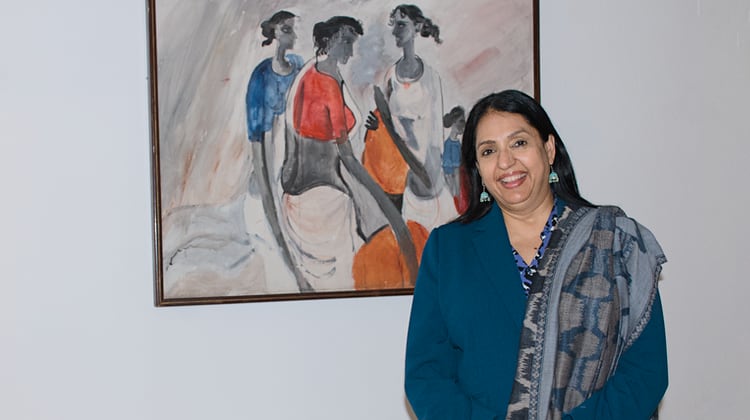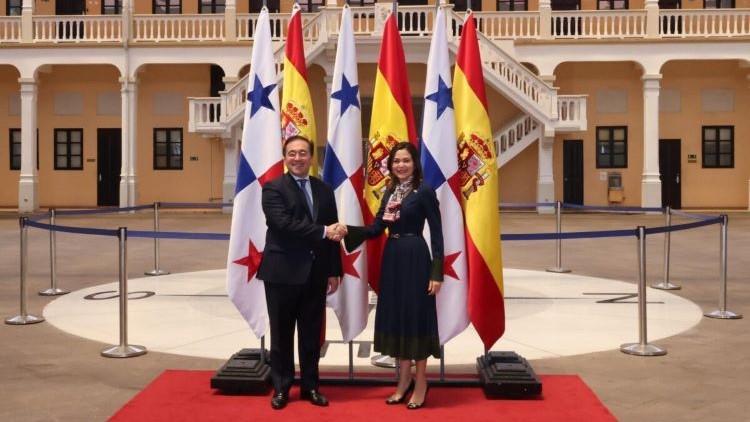Poonam Patnaik
President of the International Association of Diplomats in Spain (AIDE)
Alberto Rubio
Multifaceted and proactive. Teacher, journalist, designer, singer, painter… And yet, Poonam Patnaik is not satisfied. She wants to do more. As president of the International Association of Diplomats in Spain (AIDE) in Spain, she is determined to be useful to society and to the diplomats who are part of it.
You are the wife of India’s current ambassador to Spain, and you know you will be here for a limited period of time. What drives you to be so proactive?
It has always been difficult for me not to be able to work because I have been working since I was 16 years old. So when I got married and started travelling with my husband, I knew I wouldn’t be able to work in the same way I had been working in India. But I had to do something or I wouldn’t be happy. So, because I love children, I decided to study for my second master’s degree in education, finish my degree, and started working as an assistant in a school. That gave me a lot of experience.
You also ventured into the world of journalism.
I did my degree in journalism while working as an intern at a newspaper. I was attending evening classes and working in Bombay at the same time. I think if I had continued, I would have been very good at my job because I love talking to people and I am very open. But that’s the way things are. I hope that one day I will be able to write the book I plan to write.
What is this book going to be about?
I’m starting to think about it. Probably about migration, the reasons for many families to migrate, the influence of war, economic factors. There are a lot of people coming to India from Bangladesh who are leaving the countryside for the cities. It is an economic migration of people looking for better opportunities. Just like here, where we have Ukrainians fleeing the war or Moroccans who want a better life, to name just two cases.
I am told that you also give free yoga classes.
Yes, and Bollywood-style dancing. This also allows me to see the many coincidences between Spanish and Indian society. You are as familiar and as noisy as we are (laughs). Also, as AIDE, we are doing a course at the Complutense University on Spanish culture, history and geography for newcomers, in which we have 47 students.
Has AIDE evolved from the Association of Diplomatic Ladies that it was?
When we move from country to country, associations like AIDE can be very useful to give a sense of belonging to people like me. That’s why, when I arrived in Spain, I joined AIDE. I needed to find people who had the same concerns as me and also local people to better understand Spain. In AIDE we have this amalgam of spouses of diplomats and people with roots in Spanish society that really helps us a lot. But having said that, when I joined AIDE, for me it was very important to do something meaningful, something useful.
Of course the part where we try to raise money for charities, like the Queen Sofia Foundation, is useful, but I also want us to be able to deal with other issues like women’s empowerment, child abuse or domestic violence. I listen to stories from different countries and try to find a common solution on how we can help these people.
How are you going to do it?
That is what I am trying to achieve now. I recently met with several female ambassadors because they can share their experiences and give us a lot of information. I think they enjoyed having that conversation and being able to help us. So we are planning to move in that direction: not just meeting once a month to talk about food, dance, which is fine, but to try to go deeper.
Are you talking about involving AIDE more with Spanish society?
Exactly. I want to get more and more involved because it’s not just about collaborating but also about achieving a better understanding of each other’s culture, traditions, ways of thinking. I’ve always believed that when you teach children according to the international curriculum you also have to include local issues. They will thank you for that. If I’m going to live here for three years, I need to understand the nuances of Spanish society so I can appreciate it better.
Have you contacted any Spanish NGOs yet?
I have met with a couple of people, but they were more in the public relations sector than NGOs. I have met with an organisation that deals with autistic children and has a school that I would like to take our members to. I have started to make progress on this, but I have not yet completed a list of the different organisations I would like to make contact with.
This is a step forward for AIDE, isn’t it?
Yes, and it’s very important for me. It’s something I’ve always done wherever I’ve been. Maybe because I’m an educator I always think that we have to go deeper, that we can’t stay on the surface. We have to be useful and feel connected to a goal. When we see disturbing news, we are shocked. And from our position as diplomats we have to be able to do something, to make changes happen. My mother used to say that “if you can make a small change, it doesn’t have to be big, but you have to do your part”.
How has your initiative been seen within the association?
I think they are happy, both Spanish and foreigners. I get calls every day thanking me for what we are doing. And we are encouraging many diplomats to join who didn’t know about the association, which is open to anyone. Ambassadors can also join. I understand that they don’t have the time to get fully involved, but sometimes it’s enough with small details, like sending a few emails, for example.
Have you spoken to Madrid City Council or other administrations?
That’s my intention. But we’ve had a lot of work organising tonight’s gala. Once we finish, I would like to meet with the City Council, with the Ministry of Social Rights or with any public administration. And another thing I want to set up are workshops for women.
What will these workshops be about?
We would like experts in any area to come and share their experiences in different activities. Spanish society is very positive and the members we already have are very willing to help. I also think we need to extend our membership among Spanish society in fields such as art, culture… Involve people who can contribute in one way or another.
What timeframe have you set for all this to get underway?
As you know, we diplomats do not have a long life in the country. That’s why I would like it to be as soon as possible, maybe this year.
Would the association be open to Spanish civil society?
We are in the process of maturing the idea. We have to go step by step. I think we should be open to integrate those who have something interesting to contribute. But it is not for me to make the decision, but for AIDE’s Board of Directors to make the decision.







